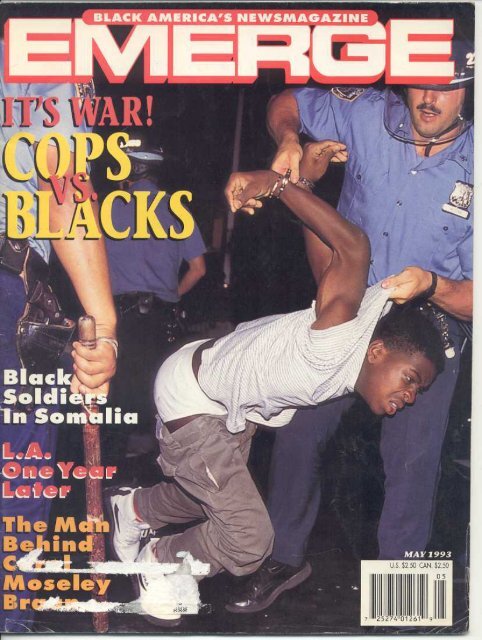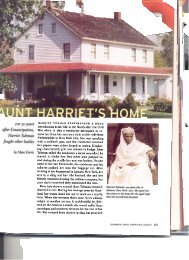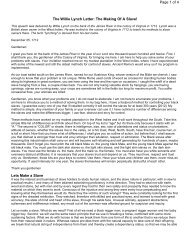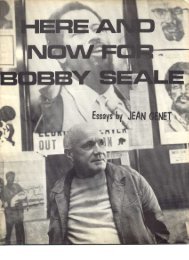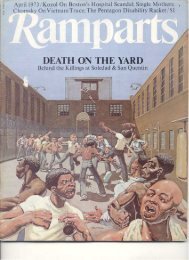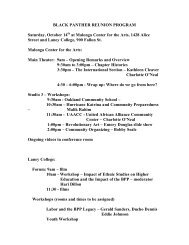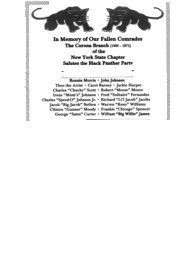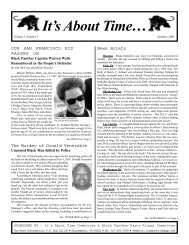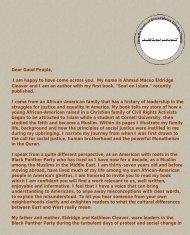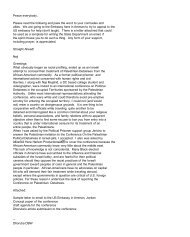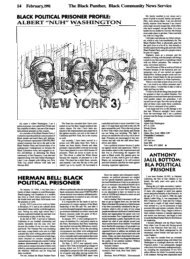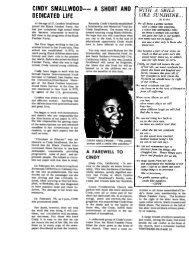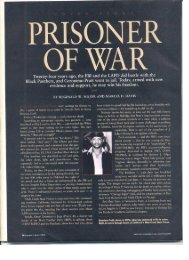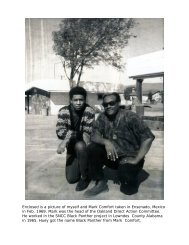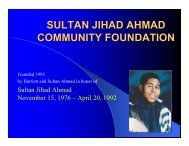Emerge Magazine - It's About Time
Emerge Magazine - It's About Time
Emerge Magazine - It's About Time
Create successful ePaper yourself
Turn your PDF publications into a flip-book with our unique Google optimized e-Paper software.
~<br />
J he evidence indicates that Lee F. Berry Jr.<br />
was guilty of traffic violations. His<br />
brother and nephew said he drove<br />
erratically and ran two red lights on the<br />
way ~ partner's northwest Detroit home. But<br />
instead of the tickets he deserved, Berry's punishment<br />
was capital. A motorcycle cop shot him dead, once in<br />
the back, again in the right leg.<br />
On the day before Thanksgiving last year, the city<br />
council voted to pay $4.2 million to settle his family's<br />
lawsuit against Detroit. The police officer, Joseph Hall,<br />
was never punished for the killing. And just as lawyers<br />
were nearing a settlement on the Berry case, police<br />
officers were fatally beating Malice Green with their<br />
flashlights on Detroit's west side. Four officers involved<br />
in Green's beating were fired; three are awaiting trial.<br />
Berry's case is not rare. Police brutality is a national<br />
problem that seldom gets the attention of the Rodney<br />
King incident in Los Angeles. Black men are frequent<br />
victims, and while white cops are often the assailants,<br />
black cops hide behind the blue curtain, too. A black<br />
mayor and a black police chief may make a difference,<br />
but don't count on it. Berry couldn't in Detroit.<br />
"Racjsm is only one part of the police brutality<br />
issue," says Diana Hfiines, executive director of the<br />
Civilian Complaint Review Board in Washington, D.C.<br />
"The real issue is abuse of power."<br />
The abuse is not limited to injuring the victim. When<br />
MAY 1993 EMERGE 27
the public's protectors become the villains, the fundamental<br />
premise that binds a citizenry to its government, the legitimacy<br />
it conveys to its leadership, is undermined. When that<br />
bond deteriorates, cooperation between the community and<br />
the police lessens, weakening the fight against crime.<br />
Unpoliced police are just a few goose steps from committing<br />
assault, battery and murder in the name of law.<br />
In more practical terms, the cost of police abuse is great.<br />
Hubert Williams, president of the Police Foundation, points<br />
to the urban rebellions that have generally resulted from<br />
incidents of police brutality. "Excessive use of force is at the<br />
heart of most of the civil disorders that have afflicted this<br />
country," he says. "There is no single offense that creates the<br />
level of violence, the trauma, the economic drain as does<br />
this issue."<br />
In two particularly disturbing examples of black men<br />
being victimized by white cops, the black men were cops,<br />
too. Two white officers were fired in Nashville, Tenn., for<br />
the Dec.14 beating of a black on-duty undercover cop<br />
who worked in the same police station and on the same<br />
shift as those who did the beating. "I feel I was treated like<br />
a piece of meat thrown out to a pack of dogs," said officer<br />
Reggie Miller, who suffered a groin injury.<br />
In a New York subway station, undercover transit<br />
officer Derwin Pannell was gunned down last November<br />
by fellow officers he recognized as he attempted to arrest a<br />
farebeater. Two white cops showered Pannell, an African<br />
American, with gunfire that left him seriously injured.<br />
Newsday reported that prosecutors struck a deal with the<br />
two shooters and two other officers on the scene, making<br />
prosecution unlikely. The prosecutors agreed not to use the<br />
officers' statements against them-just the opposite of the<br />
warning given to suspects, that<br />
anything they say may be used<br />
against them.<br />
annell said his<br />
gun was in its<br />
holster when<br />
his colleagues<br />
shots-three<br />
hit-without warning. He had<br />
collared one suspect and was<br />
looking out for another he<br />
feared might return to help the<br />
one he was holding. His relief<br />
upon first seeing his colleagues<br />
turned to shock, as he<br />
observed them "at point-blank<br />
range, in a combat stance, with<br />
their guns pointed directly at<br />
me. I covered my vitals, went<br />
into a fetal position, and was<br />
shot," he said.<br />
Police brutality often goes<br />
unpunished, even when a civil<br />
judgment-which provides an<br />
independent assessment of<br />
the facts- or settlement<br />
results in a significant payment<br />
to the victim or to the<br />
survivors.<br />
A nationwide study by Gannett News<br />
Service last year showed that cops accused<br />
of brutality get promoted more often than<br />
punished. Gannett studied 100 cases in<br />
which victims were awarded at least<br />
$100,000 because of police brutality between<br />
1986 and 1991. Local governments paid $92<br />
million in: civil judgments to victims<br />
because of the officers' actions.<br />
Yet only five of the 185 brutal cops lost<br />
their jobs. Contrast that to the 19 who,<br />
according to Gannett, either were promoted<br />
or got better law enforcement jobs<br />
elsewhere. In Albuquerque, N.M., officer<br />
Jeff House was named "officer of the<br />
month" after the city lost a civil suit and<br />
had to pay $332,500 because House had<br />
killed a burglary suspect. -<br />
Of the 2,152 complaints of abuse lodged<br />
against Los Angeles police officers between<br />
1986 and 1990, only 42 were considered<br />
valid by the department, according to the<br />
Christopher Commission, which made a<br />
study after the King beating.<br />
The Berry case in Detroit is instructive of<br />
how abuse, even death, can be Iiriked to a<br />
routine incident and how African American<br />
males are in particular danger. The oldest of<br />
five children, Berry was a 26-year-old<br />
aspiring television news anchorman who<br />
had graduated from Wayne State University ~,... -,~"",-~-~<br />
in Detroit with a bachelor's degree in radio,<br />
television and film the year<br />
before his death. It was June<br />
23,1987, one of the longest<br />
days of the year. There was<br />
plenty of summer daylight left<br />
as Berry, his 14-year-old<br />
brother, and his eight-year-old<br />
nephew made their way home<br />
from the family's moving<br />
business during the 5 p.m.<br />
rush hour.<br />
Berry pulled into the<br />
driveway of their house on<br />
West Outer Drive, near<br />
Livernois, Detroit's Avenue of<br />
Fashion. The neighborhood is<br />
middle class, with big lawns<br />
and a grassy boulevard. Home<br />
to many of Detroit's black<br />
professionals, the<br />
neighborhood is within the<br />
attendance area of Mumford<br />
High School, made famous by<br />
Eddie Murphy's t-shirt in the<br />
film Beverly Hills Cop.<br />
Berry left the van, and<br />
walked around to its front to<br />
talk with workers, who were<br />
installing a fence around the<br />
house. Moments later Hall, a<br />
police officer with nearly 20<br />
28 EMERGE MAY 1993
As noted in a document filed by the attorney for<br />
Berry's family, "According to Mr. Hall, it was Lee Jr.'s<br />
fault that he shot himself.//<br />
After the shooting, however, Frank Leake, the fence<br />
worker, had yelled to another neighbor that the officer<br />
//shot this man down in cold blood.// A federal civil jury<br />
agreed. It said the shooting violated Berry's constitutional<br />
rights and constituted battery and gross negligence. The<br />
jury awarded Berry's family $6 million, and his mother, in<br />
whose name the suit was filed, accepted $4.2 million to<br />
avoid a long appeal.<br />
Hallescap~ c~iminal<br />
b~ the Detroit P~lice<br />
years of experience, fired his<br />
weapon and killed Berry,<br />
who was unarmed.<br />
Hall testified that he had<br />
followed Berry at speeds of<br />
70 to 80 miles per hour, his<br />
emergency lights flashing,<br />
his siren sounding. No<br />
witness-neither the boys in<br />
the van nor the fence worker,<br />
nor the neighbor- indicated<br />
hearing a police siren. The<br />
boys said they did hear<br />
someone say something like,<br />
"If you make another move,<br />
I'll kill yoU." The grandfather said he heard someone yell,<br />
"Get out of that van, you [expletive deleted]."<br />
Hall said he pulled in behind the van and drew his<br />
weapon to arrest Berry. As he began to put his gun back<br />
in its holster in order to handcuff Berryi he was, so he<br />
testified, surprised when Berry turned and punched him<br />
in the face. Hall, who weighs 240 pounds and is 5' 11 II<br />
tall, had more than 100 pounds and three inches on the<br />
137-pound, 5' 71/2" Berry. The witnesses did not see a<br />
fight, nor did they testify that Hall appeared injured.<br />
Yet Hall said that Berry broke his glasses, causing<br />
blood to cover his eyes-testimony the medical examiner<br />
later found implausible. "During the struggle for my<br />
gun," said Hall in his statement, "the weapon discharged<br />
four times, striking the perp [perpetrator]. The perp was<br />
continuing to pull on my gun as it was discharging."<br />
long after the shooting and was awarded disability<br />
payments because of the psychological trauma resulting<br />
from the incident.<br />
"What happened was a whitewash:' said Juan Mateo,<br />
the lawyer for Berry's family. " ...They [police] literally<br />
get away with murder."<br />
The two Cleveland cops who killed Michael Pipkins<br />
with a choke hold three days after last Christmas are<br />
white. But the mayor, the law director, and the city<br />
prosecutor who decided not to prosecute them are black.<br />
Cleveland did not explode, but the decision so jolted the<br />
African American community that one civil rights leader<br />
died of a heart attack while denouncing the local<br />
NAACP president for backing<br />
E .the mayor.<br />
ve n ro u t .n e Prosecutor Barbara I.<br />
Danforth told a press<br />
conference that despite<br />
Pipkins' death, she found no<br />
evidence the force used was<br />
excessive. The chances of<br />
convicting the officers were<br />
not good, she added. After<br />
meeting with Mayor Michael<br />
R. White, an angry Jack Blair,<br />
Pipkins' stepfather, told<br />
reporters, "This is like a<br />
license for the police to go out<br />
and kill people. I believe we<br />
have some real weak people down at City Hall to come<br />
back with a decision like this."<br />
The president of Cleveland's Police Patrolmen's<br />
Association told its members the association had forced<br />
city officials to withhold prosecution of the officers who<br />
killed Pipkins. Bob Beck, police union president, said his<br />
organization had planned to strike if the two cops were<br />
charged. City officials backed down, he contended, in the<br />
face of the union threat. But the mayor and the prosecutor<br />
vigorously denied Beck's claim.<br />
Police officers are quick-and correct-to note that the<br />
amount of reported brutality is small compared to the<br />
number of contacts officers have with the public. And<br />
those who fight police brutality say a small percentage of<br />
officers are responsible for a high percentage of the abuse.<br />
In Chicago, for example, 2 percent of the department racks<br />
I i<br />
Ii<br />
MAY 1993 EMERGE 29
Detroit residents at the site of Malice<br />
Green. s fatal beating.<br />
up 25 percent of the complaints, according to Flint Taylor, a<br />
lawyer who has focused on police abuse.<br />
The abused citizen will get little solace from the federal<br />
government. The Justice Department's prosecution of local<br />
officers in the King case is a rare event. Of the annua13,000<br />
FBI-investigated cases of alleged civil rights abuse<br />
(generally in the form of brutality) by law enforcement<br />
officers, just 1 percent are prosecuted by the feds. That's a<br />
yearly average of 30 cases, fewer than one per state, each<br />
year from 1982 to 1992.<br />
espite the civil judgments juries are<br />
willing to bring against<br />
municipalities in police brutality<br />
lawsuits, jurors are reluctant to<br />
Drew Days, a Yale Law<br />
School professor who was assistant attorney general for<br />
civil rights under President Carter, says jurors tend to<br />
believe the police line. "<strong>It's</strong> also the case that cops are very<br />
good witnesses. They are accustomed to going into court,<br />
[and] whether they are telling the truth or lying, they know<br />
how to make a presentation jurors will believe."<br />
Furthermore, the people police choose to abuse-the<br />
poor, the homeless, the less educated-are "unlikely to<br />
convince a prosecutor to bring an action," says Days.<br />
Robert Kliesmet, president of the International Union<br />
of Police Associations, believes police abuse is down<br />
because unions are representing fewer accused officers<br />
in administrative and criminal proceedings. He also<br />
believes that brutality is more common than police<br />
officers will admit. "There's a subculture in some<br />
departments, where it is basically winked at by some<br />
supervisors," says Kliesmet, formerly a cop in<br />
Milwaukee. "If they live in one of those environments,<br />
where it is winked at by those at the top, there's likely to<br />
be more violence at the bottom." He cited the Los<br />
Angeles Police Department under its former chief,<br />
Darryl Gates, as an example.<br />
KIiesmet says fear of being injured, rather than a<br />
conscious decision to abuse power, is behind much of<br />
the brutality. Williams, chief of police in Newark, N.J.,<br />
before joining the Police Foundation, acknowledges the<br />
threat of harl);1 that often surrounds officers, but he<br />
insists they "must learn how to stay in control" without<br />
using their guns or batons.<br />
"The cop's greatest weapon-his sword-is his<br />
tongue," says Williams, indicating that the good cop has<br />
enough street savvy to keep control of most situations.<br />
He calls for better training in the use of force as one<br />
method of controlling brutality but adds that the first<br />
step is understanding the magnitude of the problem.<br />
While the FBI keeps statistics on a variety of crimes, there<br />
are none on police abuse, Williams complains.<br />
Some brutality complaints may be exaggerated to gain<br />
bargaining chips against legitimate criminal charges, says<br />
William Geller, of the Police Executive Research Forum and<br />
author of Deadly Force: What We Know. Many brutality cases<br />
go unreported because of a "fear of intimidation." Further,<br />
"police abuse often is a very low-visibility occurrence. <strong>It's</strong><br />
rare you have an audience and someone with a video<br />
camera as in the Rodney King incident."<br />
e<br />
132 West 43rd Street, New York, N. Y., 10036. phone:<br />
212-944-9800.<br />
295 Lafayette Street, New York, N.Y. 10012. phone: 212-<br />
323-8750.<br />
CIVILIAN COMPLAINT REVIEW BOARD: 101 0<br />
Massachusettes Avenue, N.W., Washington, D.C. phone:<br />
202-727-6655.<br />
OFFICE OF PROFESSIONAL STANDARDS:<br />
Atlanta Police Department, 175 Decatur Street, Atlanta,<br />
Go., 30335. phone: 404-658-7028.<br />
HEADQUARTERS: loth<br />
& Pennsylvania Avenue, Washington, D.C., 20535. phone:<br />
202-324-3000.<br />
LAWYERS COMMlnEE FOR CIVIL RIGHTS UNDI<br />
LAW: 1400 Eye Street, N.W., Suite 400, Washington,<br />
D.C. 20005. phone: 202-371-1212.<br />
NAACP LEGAL DEFENSE & EDUCATIONAL FUND, INC.:<br />
99 Hudson Street, Suite 1600, New York, N.Y. 10013.<br />
phone: 212-219-1900.<br />
OF BLACKS<br />
IN CRIMINAL<br />
P.O. Box 66271, Washington, D.C. 20035. phone: 301-<br />
681-2365.<br />
NATIONAL BAR ASSOCIATION:<br />
1225 11 th Street, N.W., Washington, D.C. 20001. phone<br />
202-842-3900.<br />
.<br />
30 EMERGE MAY 1993


